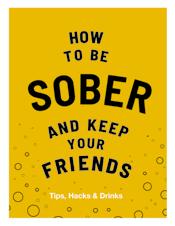
2 minute read
CAN YOU BE SOBER AND SOCIABLE?
Flic Everett ‘bobbed through life supported by a gently flowing current of booze.’ Age, the menopause and a realisation that drinking alcohol was no longer enjoyable she quit.
However the tricky part wasn’t being sober – it was having to explain it to friends and family. Everett’s book ‘How To Be Sober and Keep Your Friends’ makes you feel she’s there with you, sip by sip.
It may take Dutch courage and daiquiri just to press ‘buy’ on Amazon – but if you’re even thinking about it, it’s because you want to do something about your own or someone else’s drinking habit.
You (or they) are not alone. Almost a quarter of adults in England and Scotland regularly drink over the Chief Medical Officer’s low risk guidelines and 27 per cent binge drink on their heaviest drinking days.
There’s no shortage of factual guidance on cutting down or giving up alcohol. Trouble is it’s emotionless. Fact sheets don’t hit the spot like a botanic gin and tonic.
That’s where this book comes into its own. Everett gets inside your head, pre-empting your next hurdle. She takes all the arguments for drinking, then gives a compelling ’ah yes but…’ and an alternative to get the same buzz, but without the downside.
There’s a chapter for every challenge – going out, staying in, with friends, alone. It talks about the fear of meeting people armed only with a soda; of dating sober, ‘having to struggle through the small talk, worry about what they think of you, then – oh God – sex with a new person… would anyone ever form a relationship at all, if it weren’t for alcohol’?”
The humour is a huge help. You don’t want to become, in Everett’s words ‘your old headmistress with toothache’. But if you want to change your drinking habits, this book is the literary equivalent of a couple of glasses while you’re getting ready... it gets you in the mood.
Review by Jackie Rankin
ALCOHOL AND YOU Support for you
• Our self help guide – Alcohol and You is available online, to download merseycare.nhs.uk
• If you drink to blot out problems try to figure out what you’re avoiding. Make a list / grit your teeth and work out what the foundations of the problem are
• If you really struggle to say no, just say you’re on antibiotics …While not normally advocating fibs, it can be easier when you’re in a large group of keen drinkers
• Don’t do rounds – just say you’re saving money, so you can be in charge of your own drinks.
IS THIS YOU?
You may need help if:
• you often feel the need to have a drink
• you get into trouble because of your drinking
• other people warn you about how much you’re drinking
• you think your drinking is causing you problems.
A good place to start is with a GP. Try to be accurate and honest about how much you drink and any problems it may be causing you.
Source: drinkaware.co.uk/advice
GET HELP
Drinkline is the national alcohol helpline – call 0300 123 1110 (weekdays 9am to 8pm, weekends 11am to 4pm).
Alcoholics Anonymous (AA) is a free self-help group. Its ‘12 step’ programme involves getting sober with the help of regular support groups – aa.org
Our self help guide – Alcohol and You is available online, search Mersey Care Self Help









